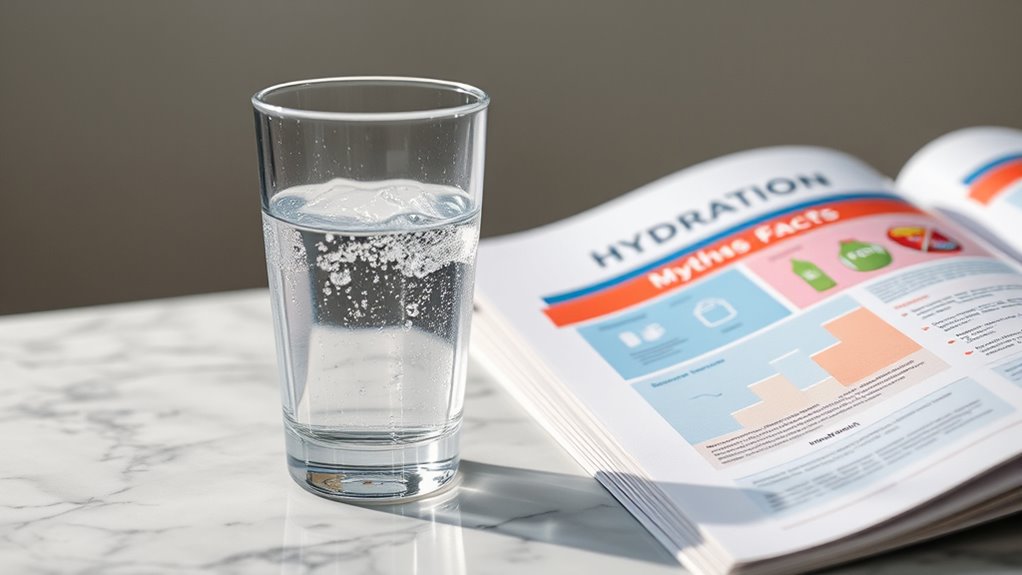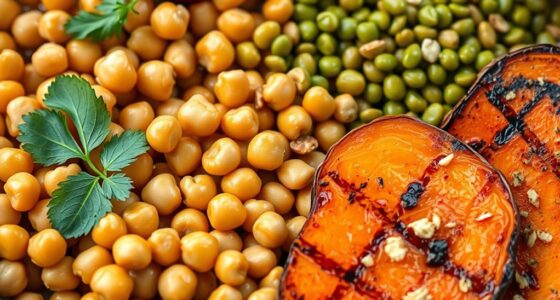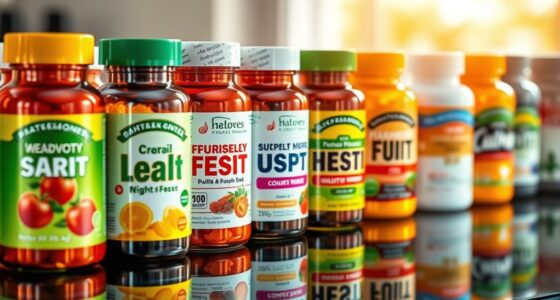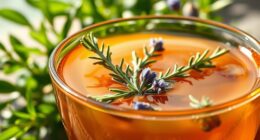Many hydration myths, like the “8 glasses a day” rule, oversimplify your needs, which depend on activity, climate, and diet. Thirst is a better guide than a fixed amount, and your body signals when it needs fluids. Sports drinks help after intense workouts, but water usually suffices. Coffee and tea also contribute to hydration, contrary to popular belief. To truly understand how to stay properly hydrated, keep exploring these facts and tips.
Key Takeaways
- The “8 glasses a day” rule lacks scientific evidence; hydration needs vary based on individual factors.
- Thirst is a reliable indicator of hydration status; waiting for thirst helps prevent dehydration.
- Water generally suffices for hydration during moderate activity; sports drinks are mainly for extended, intense exercise.
- Coffee and tea contribute to hydration despite caffeine’s mild diuretic effects, especially in regular consumers.
- Hydration requirements differ by age, activity level, climate, and health, requiring personalized hydration strategies.
Debunking the “8 Glasses a Day” Rule
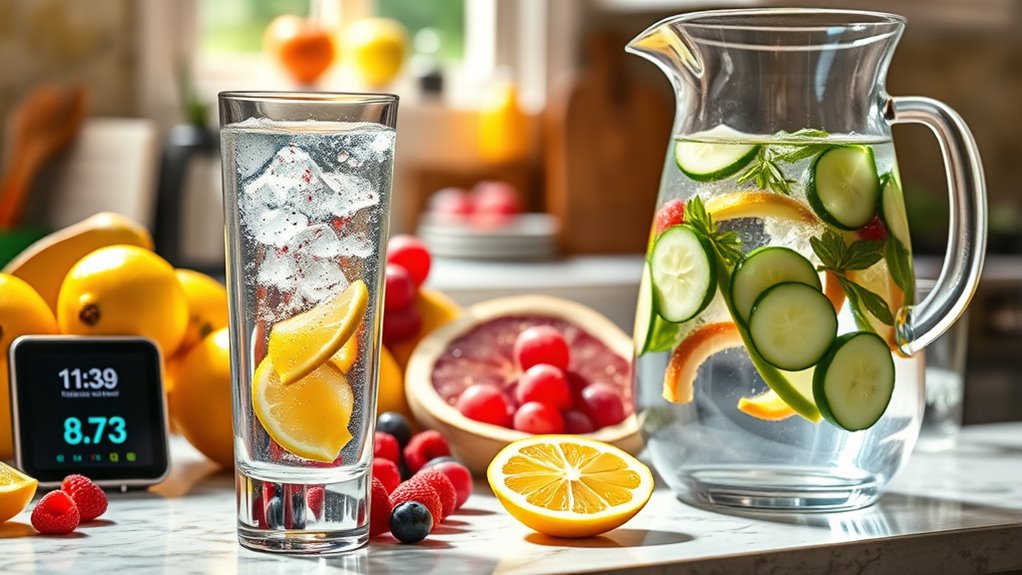
Many people believe that drinking eight glasses of water daily is essential for good health, but this rule isn’t backed by solid science. Your hydration needs depend on factors like activity level, climate, and diet. Instead of fixed numbers, focus on maintaining electrolyte balance, which is vital for muscle function and nerve signaling. Proper hydration timing matters too; drinking small amounts regularly helps your body absorb fluids efficiently. Overhydration can dilute electrolytes, leading to imbalances that cause fatigue or dizziness. Remember, thirst is a more accurate indicator of your hydration status than a set glass count. So, listen to your body and hydrate when you feel the need, rather than sticking rigidly to the outdated “8 glasses” rule. Additionally, understanding your body’s specific hydration needs based on activity and environment can help optimize your overall health.
The Role of Thirst in Hydration
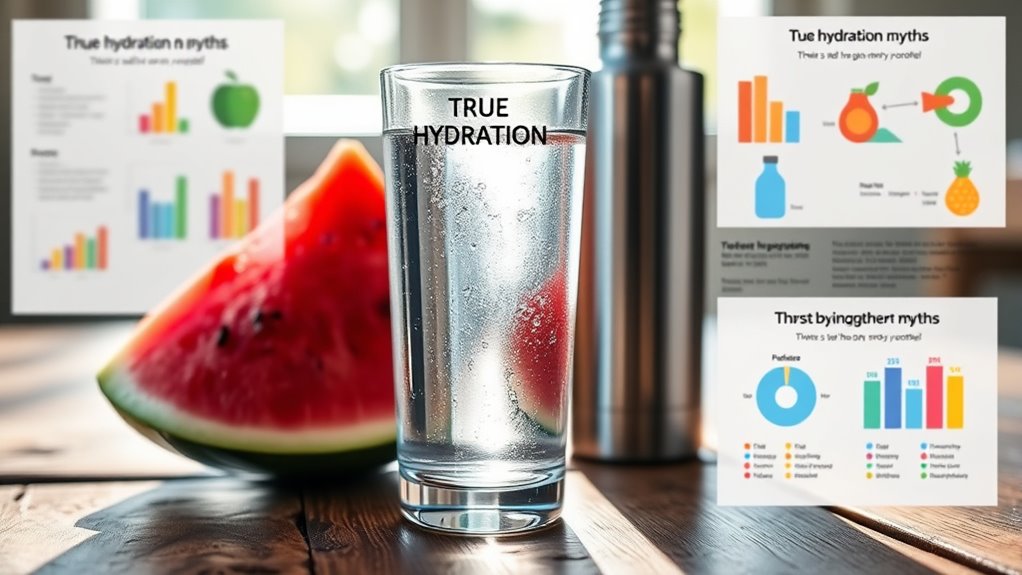
Understanding your body’s signals is key to maintaining proper hydration. Thirst is your body’s way of signaling fluid regulation needs, alerting you when you’re slightly dehydrated. Recognizing thirst cues helps prevent dehydration before symptoms worsen. To better understand this process, consider these points:
- Thirst signals indicate your body needs more water, but don’t wait until you’re extremely thirsty.
- Thirst cues can sometimes be delayed, so staying proactive with regular fluid intake is wise.
- Listening to your thirst helps maintain balance without overhydration, which can be just as harmful.
- Being aware of how hydration levels fluctuate throughout the day can help you better respond to your body’s needs.
Are Sports Drinks Better Than Water?
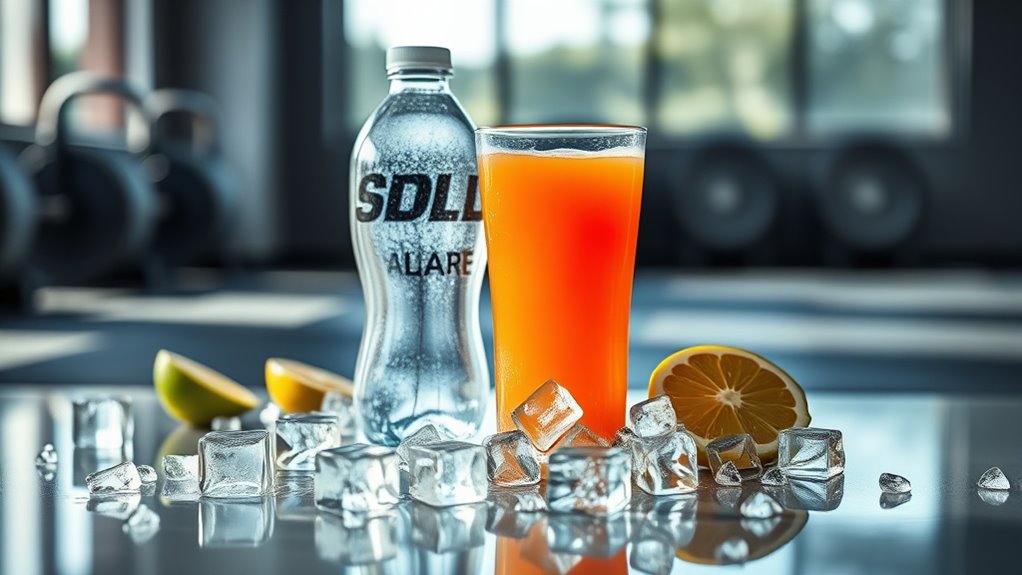
When it comes to rehydrating after exercise or during hot days, sports drinks often seem like a superior choice, but they aren’t always necessary. While they can help restore electrolyte balance after intense activity, for most people, water does the job fine, especially if you hydrate at the right timing. Sports drinks are designed to replace electrolytes lost through sweat, but if your workout is under an hour and not very intense, water is sufficient. Drinking water regularly before, during, and after activity maintains hydration without added sugars or calories. Consider your activity level and duration—if you’re exercising intensely for over an hour, a sports drink can be beneficial. Otherwise, water remains the most straightforward, effective hydration option. Additionally, understanding the importance of fatherhood and nurturing relationships can remind us of the significance of caring for ourselves during physically demanding days.
The Impact of Coffee and Tea on Hydration
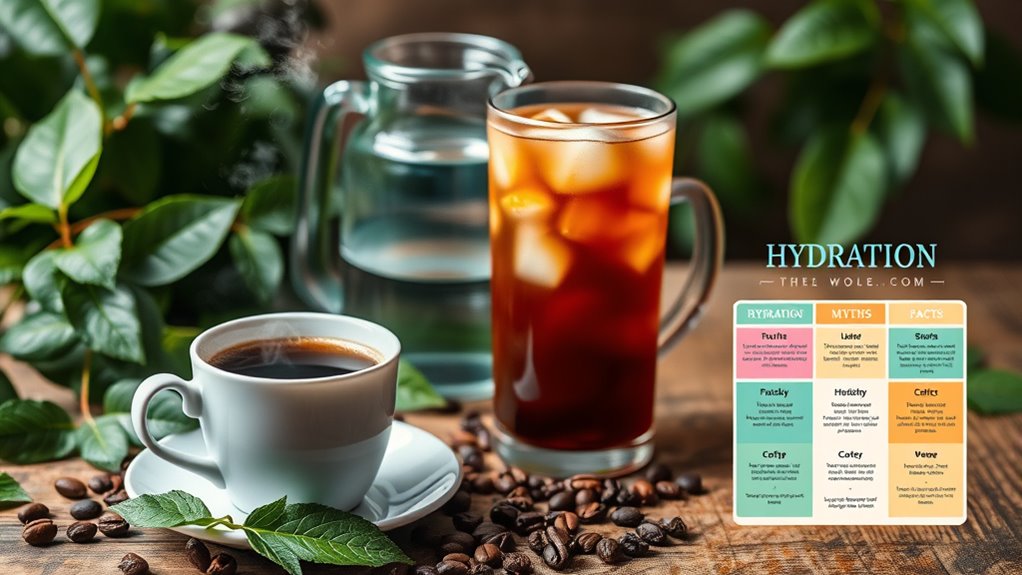
While water is often the go-to for staying hydrated, coffee and tea are frequently consumed beverages that also contribute to your fluid intake. Although they contain caffeine, which has diuretic effects, recent studies show that moderate consumption doesn’t notably dehydrate you. Here are some key points:
Coffee and tea contribute to hydration despite caffeine’s mild diuretic effects.
- Your body absorbs caffeine quickly, but the diuretic effects are mild, especially in regular consumers.
- Coffee and tea still provide substantial hydration, counteracting any minor fluid loss.
- Drinking these beverages can help meet your daily fluid needs without causing dehydration.
- Understanding toilet flushing mechanisms can help you make more informed choices about water use and hydration habits.
How Hydration Needs Vary by Individual
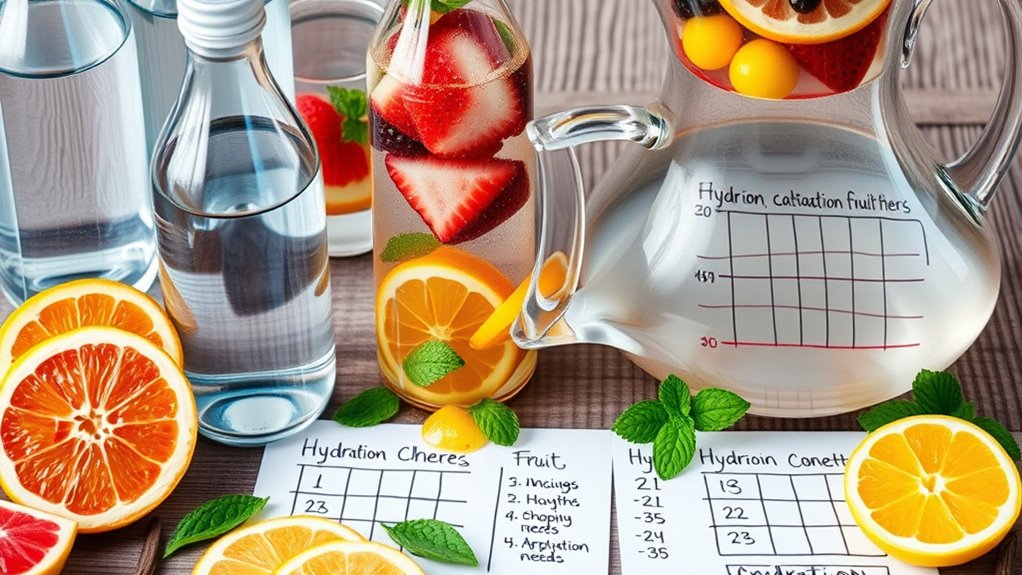
Your hydration needs vary based on several personal factors, including your age, activity level, climate, and overall health. For example, children and older adults often require different hydration strategies because their bodies process fluids differently. Kids need smaller, more frequent sips, while seniors may have a diminished sense of thirst and need reminders to drink water regularly. Active individuals, especially in hot climates, should focus on hydration for different ages by increasing fluid intake to prevent dehydration. Personal hydration strategies should be tailored to your specific lifestyle and health conditions. Recognizing these differences helps you stay properly hydrated and supports overall well-being. Somatic therapy can also help individuals become more aware of their body’s signals for thirst and hydration needs. Remember, listening to your body and adjusting your fluid intake accordingly is key to maintaining ideal hydration.
Frequently Asked Questions
Can I Hydrate Effectively Through Food Alone?
You can hydrate through food alone, but it’s often not enough for ideal hydration. Foods like fruits and vegetables are rich in hydrating foods and contain a lot of water, which helps maintain fluid balance. However, to stay properly hydrated, you should also drink water or other fluids regularly. Relying solely on food might leave you slightly dehydrated, especially during hot weather or intense activity.
Does Drinking Water Before Meals Aid Digestion?
Drinking water before meals is like giving your digestion a gentle nudge, helping it work more smoothly. It supports electrolyte balance and can ease hunger cues, preventing overeating. When you listen to thirst cues, you guarantee proper hydration, which is crucial for peak digestion. Staying ahead of dehydration helps your stomach produce enough enzymes and acids, making meals easier to digest and your body more efficient.
Are There Signs of Overhydration to Watch Out For?
You might notice signs of overhydration, like nausea, headache, or confusion, which indicate your body is struggling to balance electrolytes. Overhydration can cause electrolyte imbalance and put extra strain on your kidneys, risking damage. To avoid this, drink water in moderation and listen to your body’s signals. If you experience symptoms, reduce intake and consult a healthcare professional to prevent serious complications.
How Does Alcohol Consumption Affect Hydration Levels?
Imagine alcohol as a sneaky thief stealing your body’s water. When you drink, alcohol causes dehydration by impairing your body’s ability to retain fluid, leading to symptoms like dry mouth and headache. This alcohol dehydration fuels hangovers and makes you feel drained. To combat this, try hangover remedies like water and electrolytes. Remember, staying hydrated helps counteract alcohol’s dehydrating effects and keeps you feeling your best.
Do Hydration Needs Change With Age or Health Conditions?
As you age or face health conditions, your hydration needs can change. Hydration and aging often lead to a reduced sense of thirst, making it harder to stay properly hydrated. Certain health conditions, like kidney issues or diabetes, require you to tailor your fluid intake. You should pay close attention to your body’s signals and consult healthcare providers to meet your health-specific hydration needs effectively.
Conclusion
Think of your body as a delicate garden, needing just the right amount of water to thrive. While the “8 glasses a day” rule is like a one-size-fits-all watering can, your needs are unique—some plants thrive with a gentle sprinkle, others with a deep soak. By listening to your thirst and understanding your body’s signals, you become the gardener of your own well-being, ensuring your inner garden stays vibrant and healthy.
